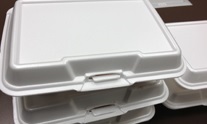 NEW YORK—Local lawmakers in New York City have introduced legislation that would effectively ban the use of polystyrene packaging at restaurants and other foodservice outlets in the area.
NEW YORK—Local lawmakers in New York City have introduced legislation that would effectively ban the use of polystyrene packaging at restaurants and other foodservice outlets in the area.
The legislation, introduced June 12 into the City Council by members Lewis A. Fidler, Vincent J. Gentile and Letitia James in conjunction with Mayor Michael Bloomberg, would prevent operators from using the plastic foam packaging at full-service and quick-service restaurants, cafes, delicatessens, coffee shops, grocery stores, vending trucks or carts and cafeterias.
Mayor Bloomberg initially proposed the ban during his State of the City address in February.
If passed, the regulation, which would be enforced by the city’s departments of health and consumer affairs, would take effect July 1, 2015. According to the proposed bill, operators who do not comply with the rule would face fines of $250 for the first violation, $500 for the second and $1,000 for the third. Manufacturers of polystyrene packaging also would be subject to financial penalties.
Councilman: Ban Could Cost ‘Millions’
City Councilman Peter Vallone urged the city to reconsider the proposed ban, saying it would “cost businesses, consumers and taxpayers millions of dollars as well as threaten jobs in the restaurant industry” and other businesses.
He asked the mayor to work with the council on other options, including recycling. “Foam can and should be recycled,” he said. “I urge the mayor to work with the council to explore this option instead of a ban.”
The National Restaurant Association, which supports the increased use of sustainable packaging, said it would appreciate the opportunity to work with the city on developing a plan that is feasible and cost-effective for the industry and consumers.
“It is important to note that in some cases, a suitable supply of alternatives to polystyrene foam packaging does not exist or is prohibitively expensive,” said Scott DeFife, the NRA’s executive vice president of policy and government affairs. “This ban could create a great burden for restaurants, more than 90 percent of which are small businesses, if those concerns are not addressed.”
Alternatives Also Have Flaws
DeFife pointed out that some alternative packaging sources have their own impact on the environment due to the energy and resources required to make them. In other cases, he said the infrastructure for recycling or composting doesn’t exist or can’t meet the demand.
“This is an area where incentives may work better than prohibitions,” he said.
A recent study conducted by MB Public Affairs on behalf of the American Chemistry Council found that a polystyrene ban would likely increase the operating costs of the city’s restaurants and other small businesses since alternative packaging is often more expensive. It also is not as effective in keeping food hot or cold, the study found.
“For a restaurant—especially a small, neighborhood business—mandating a switch to a higher-priced alternative for basic supplies can have a serious effect,” said Andrew Moesel, spokesman for the New York State Restaurant Association, when the report was issued in March. “These are businesses that are absorbing higher food and energy costs, and are under pressure from a struggling economy that leaves less money in people’s paychecks. It’s one more thing to add to the headwinds they are facing.”
The study said a polystyrene ban, if enacted, could end up costing businesses, consumers and tax payers nearly $100 million a year.
Foodservice Packaging Institute Offers Opinion
Lynn Dyer, president of the Foodservice Packaging Institute, said government limits on packaging options is not good public policy.
“Businesses should be allowed to select packaging based on its own merits of product performance, suitability, price competitiveness and impact on the environment,” she said. “A free marketplace helps to keep costs down and drive innovation.”
Dyer added that she hoped the city would “refocus its efforts on increasing recovery of all foodservice packaging instead of decreasing packaging options for foodservice operators.”
Go to the National Restaurant Assn.






